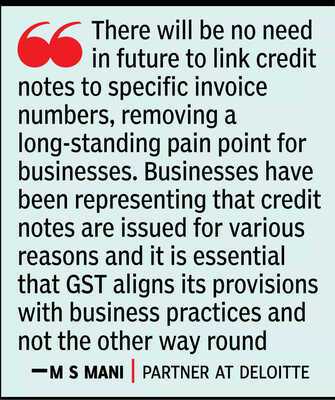NEW DELHI: The GST Council has provided a much-needed relief to businesses, especially FMCG players, as credit notes are no longer linked to the invoices , which complicates matters for companies and sellers down the line. Credit notes are common in business and are used down the chain for transactions - from the manufacturer to the wholesaler to the dealer and the retailer - for every transaction made by them.
While businesses did not encounter any challenges in case the goods sold to the retailer, through the chain, the challenge was in the case of products where the shelf life is not very long. Take the case of toothpaste, for instance, which may have a shelf life of a year but remains unsold with the retailer for nine or 10 months and is returned to the company. In this case, the credit notes float via the entire chain.
The earlier rules required every credit note to be co-related with the invoice, which meant that billions of invoices and credit notes needed to be reconciled for a large company, like Hindustan Unilever or Colgate. Now, the rules have been changed to do away with the requirement to match the two documents.
"There will be no need in future to link credit notes to specific invoice numbers, removing a long-standing pain point for all businesses.
 "Businesses have been representing since the beginning of GST that credit notes are issued for various reasons and it is essential that GST, being a business tax, aligns its provisions with business practices and not the other way round," said M S Mani, partner at consulting firm Deloitte.
"Businesses have been representing since the beginning of GST that credit notes are issued for various reasons and it is essential that GST, being a business tax, aligns its provisions with business practices and not the other way round," said M S Mani, partner at consulting firm Deloitte.
It also eases the compliance burden in the case of discounts. "Taxpayers across various sectors commonly issue commercial credit notes for reasons, such as post-sale discounts. With the proposed relaxation of the requirement to establish a prior agreement for discounts before or at the time of supply, taxpayers may now be eligible for reductions even when such discounts are given post the sale. T
his change enhances commercial flexibility and aligns with evolving business practices. Additional clarifications regarding the treatment of post-sale discounts are anticipated in an upcoming circular," PricewaterhouseCoopers said.
While businesses did not encounter any challenges in case the goods sold to the retailer, through the chain, the challenge was in the case of products where the shelf life is not very long. Take the case of toothpaste, for instance, which may have a shelf life of a year but remains unsold with the retailer for nine or 10 months and is returned to the company. In this case, the credit notes float via the entire chain.
The earlier rules required every credit note to be co-related with the invoice, which meant that billions of invoices and credit notes needed to be reconciled for a large company, like Hindustan Unilever or Colgate. Now, the rules have been changed to do away with the requirement to match the two documents.
"There will be no need in future to link credit notes to specific invoice numbers, removing a long-standing pain point for all businesses.
It also eases the compliance burden in the case of discounts. "Taxpayers across various sectors commonly issue commercial credit notes for reasons, such as post-sale discounts. With the proposed relaxation of the requirement to establish a prior agreement for discounts before or at the time of supply, taxpayers may now be eligible for reductions even when such discounts are given post the sale. T
his change enhances commercial flexibility and aligns with evolving business practices. Additional clarifications regarding the treatment of post-sale discounts are anticipated in an upcoming circular," PricewaterhouseCoopers said.
You may also like

This gold scheme of RBI made you rich, doubled your money in 5 years..

UK caravan owners 'devastated' and 'lost everything' as holiday site suddenly closes

Ex-British tennis star breaks US Open's golden Donald Trump rule on Sky Sports

ITR: File ITR by September 15, otherwise you will be fined up to Rs 5,000..

UK's 'prettiest' village is even more stunning during autumn






